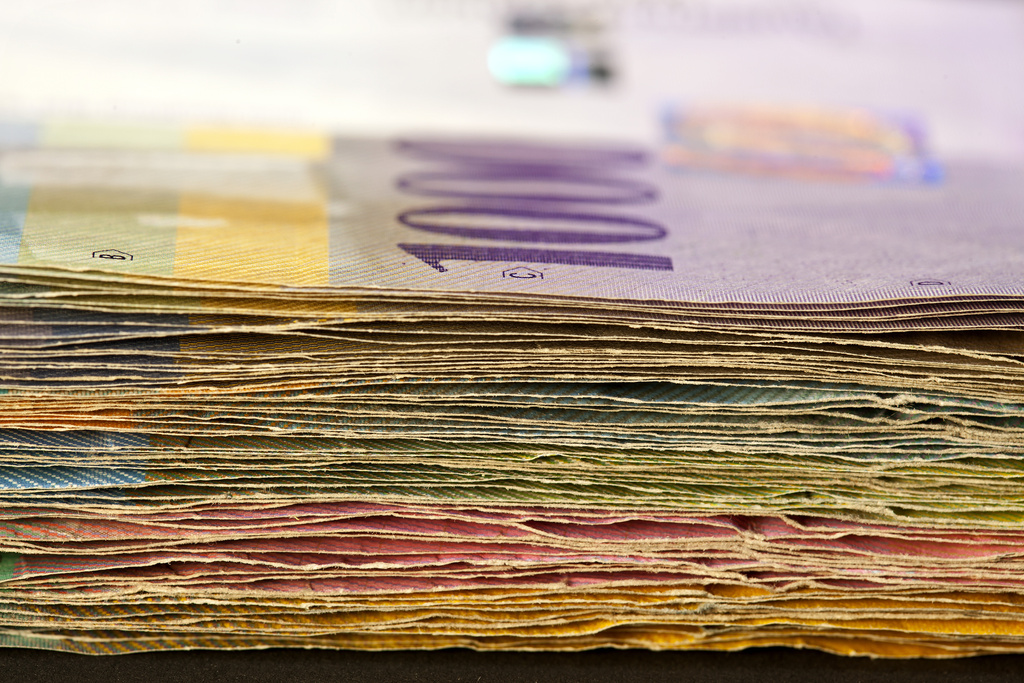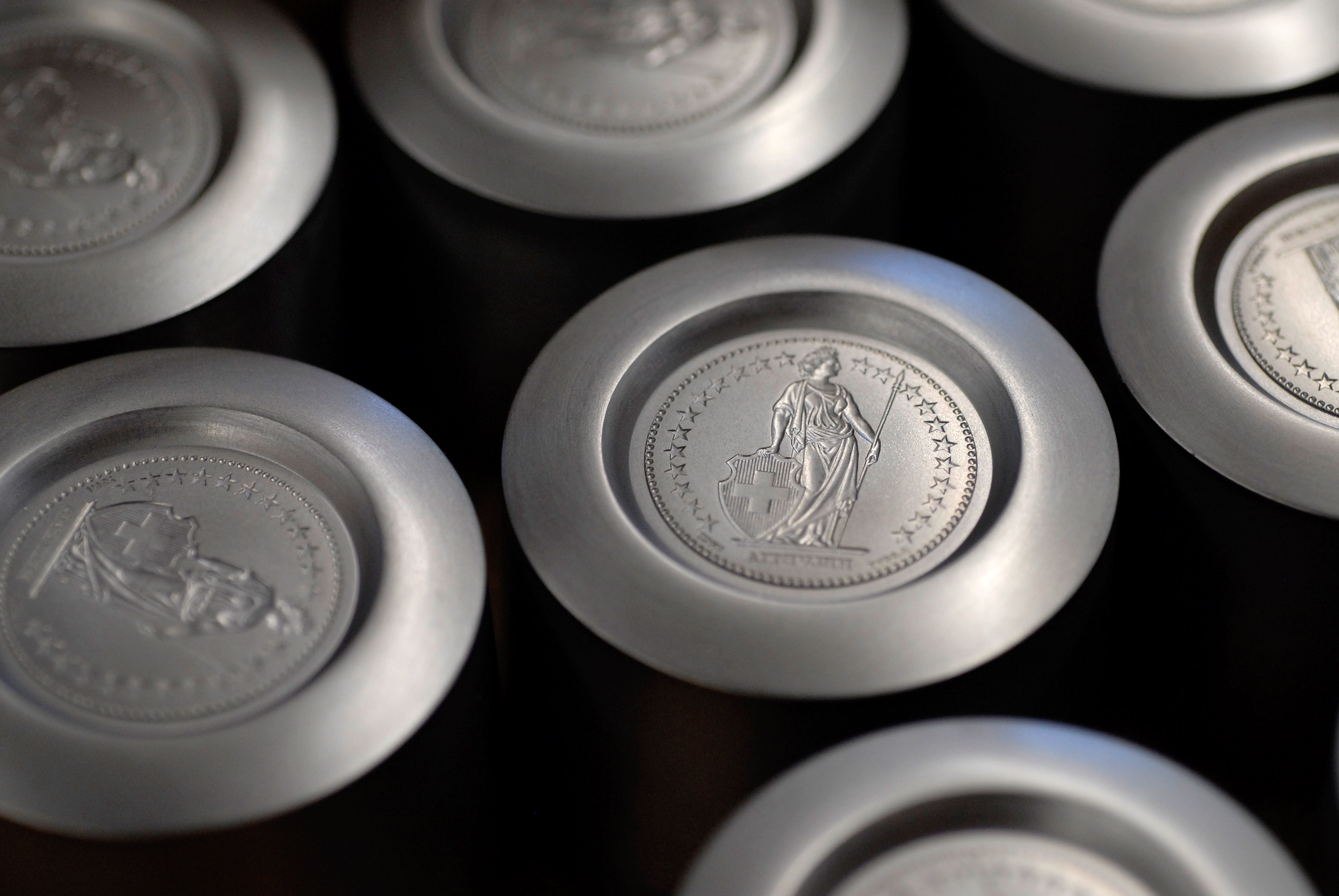Strong Swiss franc gives Switzerland the jitters

Economics Minister Johann Schneider-Ammann has called a top-level meeting for Friday to discuss what can be done to counter the increasing value of the Swiss franc.
The value of the Swiss currency, most notably against the euro, is causing alarm among Swiss exporters, particularly those who sell in the eurozone. Their products are becoming increasingly expensive.
Europe, and in particular Germany, are Switzerland’s largest export markets.
Invited to the meeting, which is being organised by the State Secretariat for Economic Affairs (Seco), will be, among others, representatives of the Swiss Employers’ Association, the Swiss Business Federation (economiesuisse), The Swiss Association of Small and Medium-Sized Enterprises and the Swiss Trade Union Federation.
The interests of the engineering, pharmaceutical, watchmaking and banking industries, tourism and farming will also be represented.
The media in Switzerland have already decided it is a “crisis” meeting, but Seco calls it an “assessment of the situation”. It also says the discussions will centre on the “opportunities and risks” in the current situation.
“Hot topic”
“It shows that it is a hot topic in the political arena and probably from Seco’s perspective it’s a good idea to bring people from interest groups together. But I doubt that we will see any concrete measures [coming] out of it,” Felix Brill, senior economist at consultancy Wellershoff & Partners, told swissinfo.ch.
A sign of the urgency is perhaps given in a short Seco statement which notes that State Secretary Jean-Daniel Gerber is giving no interviews for the time being.
Schneider-Ammann is no stranger to the ups and downs of the Swiss franc because until November last year he was head of the Bernese machine maker Ammann. He was confronted several times with the strengthening of the franc at times of monetary instability.
Before he joined the government, Schneider-Ammann was president of Swissmem, the umbrella organisation of the Swiss mechanical and electrical engineering Industries, which holds a key position in the Swiss national economy.
It is the country’s largest industrial employer, with about 330,000 workers and its exports in 2009 were valued at SFr63 billion ($65.1 billion).
Swissmem members export 80 per cent of their products and two-thirds of those exports go to eurozone countries.
“Current situation hurts”
“The current situation hurts every export company tremendously,” Swissmem spokesman Ivo Zimmermann told swissinfo.ch.
“It’s difficult to quantify but if we look at the year 2010, we’ve seen a recovery of the order intake of 12.2 per cent for the first three quarters. But then we have to say this recovery came from a very low level. That means we are by far not on the same level as before the [economic] crisis. We are now at the level of 2005/2006.”
“You might have a better order intake, but you might not earn anything from that because the exchange rate at the current level erodes the margin,” he added.
While Brill does not expect concrete measures, the Swiss business community and others have not been short of ideas on how to ease the problem.
Nick Hayek, CEO of the Swatch Group and Paul Rechsteiner, president of the Swiss Trade Union Federation, have suggested pegging the franc to the euro.
“Air bubbles”
For Gerold Bührer, president of economiesuisse, this idea was just “air bubbles”. There are certainly pros and cons, according to economist Brill.
“In principle it would be possible but you would have to live with the consequences. It would be expensive for the Swiss National Bank, then you lose your independence in monetary policies,” he told swissinfo.ch.
“That means you would have to adopt the monetary policies of the European Central Bank which might lead to higher inflation here in Switzerland and this might be the first step into the European Monetary Union.”
Brill also notes the pressure that is being put on the Swiss National Bank (SNB) to keep the rising franc in check. But, he argues, it cannot do too much more.
“We have seen that the SNB has tried a lot in 2009 and until May 2010 buying a lot of euros. In the end it didn’t help much. There’s a lot of talk in the eurozone about debt issues, so it’s not only a matter of the Swiss franc… you can’t unilaterally do anything.”
No magic
Bührer at economiesuisse agrees, saying the central bank has done all it could “but it cannot stop the trend”. He told German-language Swiss radio on Monday that there was no magic that could be performed and technical means would not help.
Another suggestion supported by the trade unions and the SMEs is to reintroduce a gentlemen’s agreement between the SNB and Swiss banks that came into in operation in 1976. This was to dissuade the banks from carrying out doing speculative currency transactions.
“Quite conceivable,” argues Hans-Ulrich Bigler, director of the association of SMEs, adding that the banks have no interest in seeing low economic growth.
Here again, Brill says there are two sides to the coin. “It might help relieve some pressure but on the other hand it’s not only speculation that’s driven the development of the Swiss franc recently”.
Currency protection
He wonders if the definition of speculation would also include currency protection measures taken by big Swiss companies.
“How would you judge? The larger the companies get and the more internationally active they are, the more they need protection measures because they have to hedge against the euro and a lot of [other] currencies,” said Brill.
Other measures suggested include selling gold, accelerating inflation, negative interest rates, limiting the inflow of capital and paying salaries to cross-border workers in euros.
According to the economics ministry, the government is in close contact with the central bank on the strong franc issue. But the government respects the independence of the SNB as far as monetary policy is concerned as “a factor of success of the Swiss economy”.
The Swiss franc is a so-called “safe haven” currency, that means that investors and speculators buy it when other currencies, including the euro and the United States dollar, are under pressure.
The increasing value of the Swiss franc is a source of great frustration for exporters because their goods are more expensive to sell outside Switzerland, particularly in the eurozone.
It costs around SFr 1.25 ($1.29) to buy a euro at present. A year ago, it would have cost SFr1.48. The increase in the value of the franc over the 12 months is about 15%.
The Swiss National Bank has emphasised that it does not pursue an exchange rate target, but consistently bases its monetary policy on its legal mandate.
This mandate stipulates that “the SNB is required to ensure price stability, while taking due account of economic developments”.
It is the official currency of the euro zone, which includes 17 of the 27 members of the European Union.
The euro zone consists of Austria, Belgium, Cyprus, Estonia, Finland, France, Germany, Greece, Ireland, Italy, Luxembourg, Malta, the Netherlands, Portugal, Slovakia, Slovenia and Spain. It is also used in a number of other European countries.
The currency is used daily by well over 300 million Europeans. It is also used by more than 150 million people in Africa.
It is the second largest reserve currency and the second most traded currency in the world after the US dollar.
Euro banknotes and coins entered circulation on January 1, 2002.

In compliance with the JTI standards
More: SWI swissinfo.ch certified by the Journalism Trust Initiative














You can find an overview of ongoing debates with our journalists here . Please join us!
If you want to start a conversation about a topic raised in this article or want to report factual errors, email us at english@swissinfo.ch.